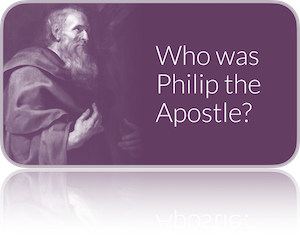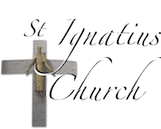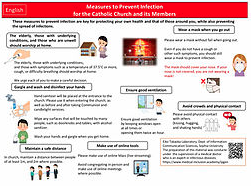
Homily (5th Sunday of Easter) Jn.14:1-12
Philip: A Man of Caution and Commonsense
In the Gospel of today we come across one of the most remarkable disciples of our Lord Jesus Christ, and that is the apostle Philip. What do we know about this man? According to scholars Philip was perhaps a Hellenistic Jew, and some believe he perhaps was present at the Wedding Feast Of Cana, where Jesus worked his first miracle. He hailed from the town of Bethsaida, which was also the town where the brothers Peter and Andrew lived. “Philip” is a Greek name, and it means “a lover of horses.” He probably had a Jewish name as well because the apostles were all Jews, but his Jewish name is not found in the Bible. Since Philip was from Bethsaida which was the town of Peter and Andrew, the three apostles perhaps grew up knowing each other, and with the brothers James and John they all lived in the general area around Capernaum.

Before becoming a disciple of Jesus Philip was probably a follower of John the Baptist. We see that at least seven of the apostles, namely, Philip, Nathanael, Thomas, Peter, Andrew, James and John were skilled fishermen, and they most likely had been friends and co-workers for a long time before meeting Jesus. A fascinating member of this group was Nathaniel from Cana, who was also called Bartholomew. After Philip met Jesus he went to see his friend Bartholomew, but when he informed Bartholomew that Jesus was the Messiah and that he hailed from Nazareth, Bartholomew gave his famous sarcastic reply, wherein he asked, “can anything good come from Nazareth?” This reply sounds appalling, because it reveals a deep disregard for the people of Nazareth. However, he probably did not mean it in a negative way, because when Jesus himself saw Bartholomew he praised him highly. Jesus called him a true Israelite and a man with no guile, and later as we know Bartholomew became a close friend and faithful disciple of Jesus.
On observing the nature of Philip we notice certain interesting features about him. He was a serene and tranquil man, a man of commonsense. When his friend Bartholomew made that cynical remark about Nazareth, Philip did not react in anger. All he said was, “come and see for yourself,” and when Bartholomew saw Jesus, he was immediately overcome by his kindness and became his faithful disciple.
Philip was also a man of caution. Even on encountering Jesus he gave the matter due thought. He was careful in his attention to detail, and he never overlooked anything vital. On one occasion when Jesus had preached before a large crowd of several thousand people, he said to Philip, “Where shall we buy bread for these people to eat?” He said this merely to test Philip, for he had already decided what he was going to do. Philip’s answer was, “It would take more than half a year’s wages to buy enough bread for each one of these people to have a bite,” but then, along with his friend Andrew, Philip also began to study keenly as to how the crisis may be solved. Luckily however Jesus did not force him to spend too much time worrying about the issue, because he instantly worked a glorious miracle and fed the 5000 people.
John 12: 20-22 states that there were certain Greek converts to Judaism who had come to worship at the feast. They approached Philip and requested an interview with Jesus. Philip being a Greek name, he may have had some knowledge of the Greek language, which may have been a reason why those Greeks came to him. On seeing them Philip consulted his friend Andrew, and they both reported the matter to Jesus. Introducing unfamiliar persons to Jesus may have been a risky thing to do, but Philip and Andrew handled the matter with concern and care.
Today’s Gospel presents us one of the most beautiful incidents in the life of Philip, and it occurred because Jesus said, “I am the way the truth and the life. No one comes to the Father except through me.” On hearing that statement Philip perhaps had greatly pondered over it, and he finally plucked up courage and said to Jesus, “Lord, show us the Father and that will be enough for us.” It was then that Jesus informed Philip clearly that He and the Father were one and the same God. Seeing Jesus, was the same as seeing the Father. That is to say, in a few words Jesus explained to his disciples the mystery of the Blessed Trinity.
Philip’s death is not cited in the Bible. However according to tradition, he died as a martyr by crucifixion. Philip was crucified upside down like his friend Peter, perhaps because he felt that he was not worthy enough to be crucified in the same manner as his Savior, the Lord Jesus Christ.
Fr. Cyril Veliath, SJ
 ENGLISH
ENGLISH  ESPAÑOL
ESPAÑOL 







